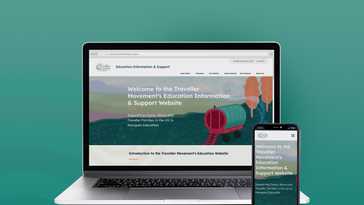Our Mission: Home Education
Discover Our Elective Home Education Strategy as a Key Area of Concern
Overview of Home Education
Elective Home Education (EHE) is an area of great interest for the Traveller Movement. There is significant work being undertaken with Parliament and Government to address the significant issues around the current working of EHE.
During the course of our casework, we have advised and advocated for dozens of parents who are facing fines and court attendance due to issues arising from electively home educating their children.
Due to the prominence of this topic, we shall shortly be putting out a report, which will build upon the work we undertook in January 2022, to provide Parliament’s Education Committee with evidence that shows Gypsy, Roma and Traveller children are disproportionately impacted by the current step up and operation of EHE in the UK. Please feel free to Contact Us if you have any experiences of issues with EHE, or if you are a professional who would like the report to highlight specific areas of concern you may have.
Our Evidence
Overview
As stated above, EHE remains an area of concern for the Traveller Movement, as we believe that Gypsy, Roma and Traveller children and young people are disproportionately affected by the poor regulatory standards the government has set for monitoring EHE in the UK.
Recent evidence and reports to the Traveller Movement from sources wishing to remain nameless, have spoken about the increased levels of EHE for children from the travelling communities. Whilst this perception is not new, some figures provided by local authority staff have been concerning, with one member of staff stating this in last years Year 6 intake there were a reported two hundred Gypsy, Roma and Traveller children on-roll at primary schools. However, in the transition to Year 7 in September 2021, only fourteen of these two hundred children were recorded as attending a secondary school for their Year 7 education. Although this information is unverified and from a discrete source it is concerning for two reasons. Firstly, the numbers reported are extreme, suggesting that within one UK local authority less than 10% of Gypsy, Roma and Traveller identified children moved from primary to secondary education. Secondly, and perhaps even more concerning, is that there currently is no system to even be able to verify these figures, as there is no requirement for parents to register their children with local authorities to provide EHE.
Pathways to EHE
It is important to begin assessment of EHE by looking at why parents choose to EHE their children, and which factors influence this decision. Throughout our advocacy work, we have come across the following reasons parents have given to describe why they have chosen to use EHE rather than school-based education.
In general, the principal reason for a parent opting to provide home education is due to a dispute which has arisen between the parent and the school. The dispute may be in relation to behaviour of the Gypsy, Roma and Traveller child, however what has proven more common is the failure of the school to correctly address the poor behaviour of another child, of which the Gypsy, Roma and Traveller child has been a victim. Please see below for reasons we have come across for parents choosing to EHE their children:
- The subject of bullying has been raised regularly. With families fearful of a culture of bullying within schools which goes unaddressed and does not adequately protect or vindicate the victim.
- In addition to wider bullying practices being reported, there has been a significant number of parents reporting their child has been bullied based on their race as a Gypsy, Roma and Traveller person.
- It is a simple preference of the parent or pupil to be home educated. This is rare and has been presented in circumstances where a clear answer may be being withheld.
- The failure of schools to meet the special education needs (SEN) of children in their care. Conditions such as social anxiety, obsessive compulsive disorder and autism have all been increasingly reported to the Traveller Movement across all areas, but specifically in relation to the removal of children from school, as parents consider that they are better able to provide support. This has also been seen with schools who are overwhelmed by the administration of SEN registers and Educational Health Care Plan (EHCP) provisions required to support pupils, with reports of EHCP’s taking up to two-years to produce and annual reviews of these reports being delayed and dropped.
- There exists a fraction of Gypsy, Roma and Traveller communities who attest that their culture promotes home education for their Gypsy, Roma and Traveller children. It is usual to hear this mentioned in relation to girls accessing education, which comments about girls needing to focus instead on preparations for becoming a stay-at-home wife and mother.
‘Constructive Exclusion’ is term a created by the Traveller Movement. It is defined as an exclusion which does occur through usual means but is a process where an education provider acts, or fails to act, in way which makes the continuation of a child’s attendance impossible. For example, a child who is being persistently racially bullied at school and reports this, but the schools fails to act to ensure the child’s safety by not suitable disciplining perpetrating children and not putting in place effective safeguards to protect the child from ridicule, assault or similar. This term can apply to any situation where the school’s failure to act in a lawful or dutiful way presents an unsafe or significantly unsuitable learning environment for any child. It can also be applied to scenarios, which have been reported to the Traveller Movement where schools encourage or attempt to trick parents in to signing EHE consent papers to off-roll their child. The result of a constructive exclusions often presents in a period of EHE, whilst the parents, work out what is best to do next.
Issues of EHE
Issues relating to a child or young person receiving ineffective EHE are broad and significant. Detailed below are the key issues Gypsy, Roma and Traveller families are likely to come across according to our casework:
- Parents, who are non-professional teachers providing tuition for EHE pupils. This is a well reported issue within the Gypsy, Roma and Traveller communities, with parental illiteracy and other poor attainment standards a significant problem. This means that a person with no qualifications of their own is currently permitted to teach children who are potentially studying above their own ability.
- There are limited public resources for providing private tuition for those unable to attend school. This means that parents receive little to no support in educating their children, even when their child has been constructively excluded from school.
- Exams are not provided free of charge to young people sitting their GCSE’s. This means that a great number of Gypsy, Roma and Traveller pupils who are EHE may leave mandatory education with no qualifications.
- EHE provides limited social interactions for pupil educated at home. This leads to greater Gypsy, Roma and Traveller community isolation, which in turn only increases issues of social discrimination against Gypsy, Roma and Traveller communities.
- Families who are assessed as not providing ‘suitable’ education are at risk of being criminalised by the issuing of a School Attendance Order (SAO) and a fine, with potential for greater criminal liability should the situation not be improved to the standard of the local authority.
- Parents are able to opt to provide EHE even when it is not in the best interest of the child, even though the government states that this criterion must be met.
- Through are casework, it is common to see parents who want the best for their children but have a poor memory of their time in education and want to protect their children from bullying and harassment they see as prominent in schools against Gypsy, Roma and Traveller children and young people.
- Girls seems to make up the majority of EHE cases presented to the Traveller Movement, with long standing community beliefs that girls do not need to be educated as they will grow up to be wives and mothers and have no need to work. At the Traveller Movement we discourage this belief and urge families to ensure all children are educated to protect their futures and maintain their opportunities in life, should a more independent life be necessary, such as through a breakdown in marriage or domestic violence.
- We have seen that even when children only spend a limited time being EHE, educational progress is often impaired, social reintegration becomes harder and the chances of successfully returning to school decrease.
Outcomes of EHE children
Outcomes for children who are EHE are mostly unknown as there is no national register from EHE children and families. However, based on cases the Traveller Movement have worked in relation to EHE, we predict the following:
- Lower levels of attainment, especially at important GCSE examinations. This in turn leads to reduced career prospects and opportunities which directly relate to an individual’s income potential.
- As with exclusions and those with lower educational attainment, we predict that children receiving current levels of unsuitable EHE will have an increased chance of criminal justice involvement.
- There will continue to be increased community isolation for Gypsy, Roma and Traveller people. This we know translates to poor health and mental health and reduces individuals’ ability to access care and other essential social services
Recommendations for EHE policy
It is of vital importance for the wellbeing and futures of Gypsy, Roma and Traveller children and young people in the UK that policy changes are made to safeguard their rights to a good education and to prevent hostile school environments, or school procedural failures to reduce the quality of education they receive:
- The mandatory registration of EHE pupils nationally needs to be implemented. This register must include data gathered on the race of the child and parents.
- Greater evaluation of curriculum being taught to pupils who are EHE, with assessments conducted annually to ensure they are progressing at a similar rate of their peers in formal education.
- The person providing the EHE must have gained a pass qualification grade at least one level higher than that for which they are teaching. For example, person teaching primary must have GCSE’s and person teaching secondary must have A-Level or equivalent.
- The person providing the EHE must demonstrate their person availability to teach, for example they must be available for a suitable number of hours per week to provide tuition for the EHE pupil.
- There needs to be greater support for Gypsy, Roma and Traveller children and families in schools to make the learning environment a safer place to be for Gypsy, Roma and Traveller pupils. For example, increased guidance and policy on bullying in schools, inclusion of Gypsy, Roma and Traveller History Month in school personal development plans for children.
- There needs to be a national ‘reintegration strategy’ which informs schools on the best way to reintegrate a child in education who has been missing or unsuitably EHE for a period, especially those from a Gypsy, Roma and Traveller background.
- Covid-19 catch-up tuition needs to continue for all children but should be extended to support those families who are EHE their children, should they wish to use it.
- Local authorities should employ specialist staff who are trained and knowledgeable of Gypsy, Roma and Traveller communities and who can work to help families understand what they could expect should they choose or be required to reintegrate their child back into a school setting.


